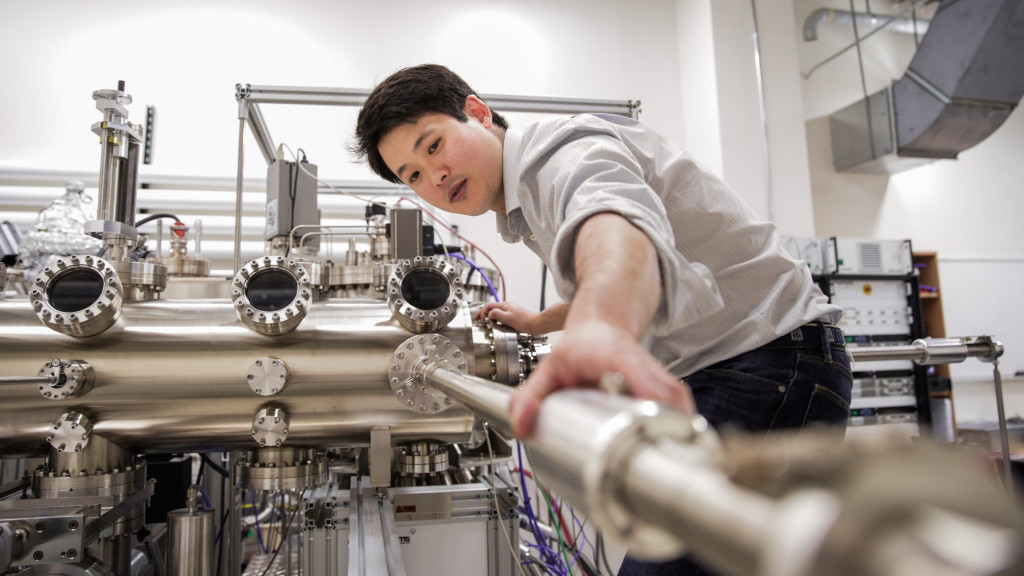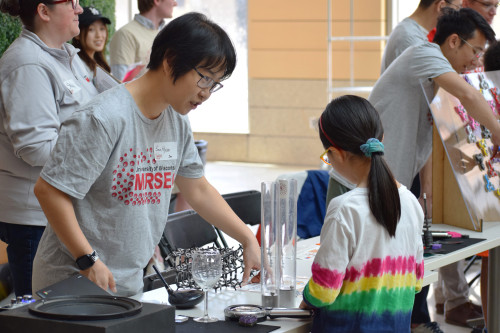UW will launch materials engineering research initiative with major NSF sponsorship

Associate Professor Jason Kawasaki is co-lead of a MRSEC research thrust investigating magnetic states in strained membranes, which could lead to new types of ultrafast data transmission and storage. The research thrusts of UW–Madison’s Materials Research Science and Engineering Center brings together teams of researchers from diverse backgrounds to better understand disordered materials, including various types of glass, as well as the emergence of order from disordered materials. Steph Precourt
The University of Wisconsin–Madison Materials Research Science and Engineering Center (MRSEC) has received $18 million from the National Science Foundation (NSF) for interdisciplinary exploration of fundamental questions in materials science.
The grant will provide six years of funding for MRSEC, which includes more than 30 affiliated faculty across nine university departments, as well as collaborators at other institutions and in industry. MRSEC is one of 21 NSF-funded centers that conduct fundamental materials research, education and outreach at the nation’s leading research institutions.
This round of funding marks a quarter-century of support for the MRSEC, a testament to its successful efforts to investigate fundamental, interdisciplinary questions in materials science and provide outstanding educational opportunities and outreach efforts in the community.
“Our continued success reflects the strength and breadth of the materials research effort across campus,” says Paul Voyles, MRSEC director and a professor of materials science and engineering. “It takes an institution with the overall excellence of UW–Madison to continuously maintain the high level of research necessary for one of these centers.”
Research supported by the MRSEC has led to many discoveries, including:
- Liquid crystals useful in sensing toxic gases.
- New types of semiconductors that could power next-generation devices.
- A deeper understanding of carbon nanotubes that could be important in next-generation solar.
- Advances in the synthesis of thin film oxides that could lead to new electronic devices.
- New understandings of glass, which could lead to tougher versions of the material and new types of organic electronic computer displays or photovoltaic cells.
The MRSEC has also launched 13 startup companies in areas ranging from scientific instrumentation to medical diagnostic technologies. In addition to two interdisciplinary research groups, the MRSEC has an inclusive education outreach team, shared instrument facilities and the Advanced Materials Industrial Consortium.
The research thrusts bring together teams of researchers from diverse backgrounds to better understand disordered materials, including various types of glass, as well as the emergence of order from disordered materials.
The first thrust, co-led by Voyles and Izabela Szlufarska, chair of the Department of Materials Science and Engineering, will study mobility in glass and supercooled liquids. The second research group, led by Jason Kawasaki, an associate professor of materials science and engineering and Uwe Bergmann, a professor in the Department of Physics, focuses on magnetic states in strained membranes.
Another priority for MRSEC is support of facilities for materials research on campus, including the Nanoscale Imaging and Analysis Center, Soft Materials Characterization Lab, Nanoscale Fabrication Center, and others. During this grant period, the center plans to launch a new user system called X-FAST, or extreme ultraviolet femtosecond absorption spectroscopy, designed and built by Bergmann. The center will upgrade the machine and make it available to scientists from around the world.
The center will also continue its tradition of outreach excellence, bringing materials science education to students, led by Faculty Associate Anne Lynn Gillian-Daniel and Ahna Skop, a professor of genetics and life sciences communication.

Post-doctoral researcher Soohyun Im is one of many MRSEC members who bring materials science education to students from all walks of life during outreach events. The grant will enable MRSEC to continue its education and outreach efforts. University of Wisconsin–Madison
“With the new grant, we are leveraging our education and outreach expertise to create educational activities and outreach experiences that are accessible to people who are blind or visually impaired and to families who are economically disadvantaged,” says Gillian-Daniel.
MRSEC also will continue to run the Advanced Materials Industrial Consortium, a group of industry partners that provides invaluable professional development opportunities for UW–Madison students and researchers.
Voyles says MRSEC is an asset for collaborative, interdisciplinary science across UW–Madison. “The MRSEC has driven critical aspects of the materials research culture on campus, including an openness and flexibility toward interdisciplinary research,” he says. “And the idea that materials research at UW–Madison extends well beyond the walls of the Materials Science and Engineering Building.”
Read more about the research this funding will enable.
